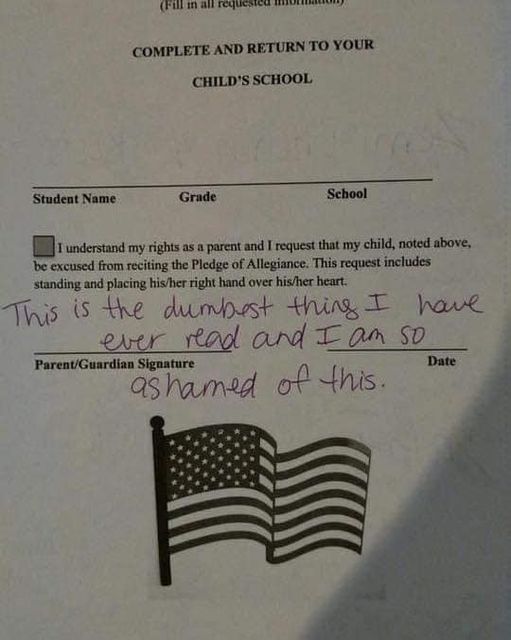Patriotism isn’t simply about reciting a pledge or waving a flag; it’s about the liberty to decide how one shows love for their country. An image shared by Karla Cortes on October 20, 2024, has sparked an important discussion on this topic. The image highlights a form that allows parents to choose whether their children will participate in reciting the Pledge of Allegiance, emphasizing that freedom of choice is a cornerstone of a truly free society.

At the heart of democracy lies personal freedom, a vital principle that allows individuals to follow their beliefs without being forced to conform to a singular standard. For many, reciting the Pledge of Allegiance is a meaningful expression of love and unity for their country. However, the true essence of patriotism should not be tied to mandatory acts or rituals. Instead, it is rooted in the freedom that empowers people to decide how they want to express their loyalty. Patriotism flourishes not through compulsion but through choice.
The handwritten note in the shared image represents more than a simple decision; it symbolizes an individual standing firm in their beliefs, a genuine act of patriotism. Defending one’s personal beliefs while respecting the choices of others embodies the spirit of democracy. Respect for individual freedom, even when it involves dissent, strengthens rather than weakens national unity. It emphasizes that patriotism is not a one-size-fits-all concept but rather an inclusive idea that welcomes diverse expressions of love for one’s country.
A thriving democracy allows people to express their beliefs in ways that align with their values. Whether one chooses to recite the Pledge or to opt out, the most important aspect is that the decision is genuine and based on conviction. By honoring this freedom, democratic values are upheld, and a stronger, more cohesive society emerges. It’s not the uniformity of gestures but the sincerity behind them that defines true patriotism.
Today, as the debate around national symbols and expressions intensifies, it’s vital to recognize that patriotism can manifest in many forms. Some people may demonstrate it through public displays of loyalty, like standing for the Pledge, while others may prefer quieter acts of service, such as community volunteering, civic engagement, or advocacy for change. The diversity of expressions enriches the nation, reflecting the many ways citizens can contribute to the country’s growth and well-being.
Patriotism is not limited to rituals or visible symbols; it’s found in everyday actions that contribute to the betterment of society. It could be as simple as casting a vote, lending a helping hand, or standing up for the rights of others. Respecting differing opinions, even when they don’t align with one’s own, is what sets a free society apart. It’s the freedom to disagree, protest, or choose silence that represents the true measure of patriotism.
The image shared by Cortes highlights an essential aspect of what it means to live in a democratic society—one where the freedom to choose is respected and encouraged. It’s a reminder that patriotism is not just about traditions or rituals but about embracing the freedom that defines the nation. When individuals are allowed to express their love for their country in ways that align with their beliefs, the nation becomes stronger, more united, and more authentic.
In the context of national pride, the freedom to choose how to express love for the country should be cherished. Whether it’s through a formal pledge, activism, or silent reflection, each form of expression has value and contributes to the nation’s collective identity. A society that celebrates diverse expressions of patriotism is one that truly understands the meaning of freedom.
As we continue to explore what it means to be truly patriotic, it’s crucial to remember that a healthy democracy is built on the principles of personal choice and respect for differing views. True patriotism isn’t about demanding conformity; it’s about fostering an environment where individuals feel empowered to express their beliefs honestly. This approach not only strengthens the nation but also nurtures a culture of mutual respect.
So, what does patriotism mean to you? Do you believe it should be a matter of personal choice, or should certain traditions be maintained uniformly? Let us know your thoughts in the comments below!





